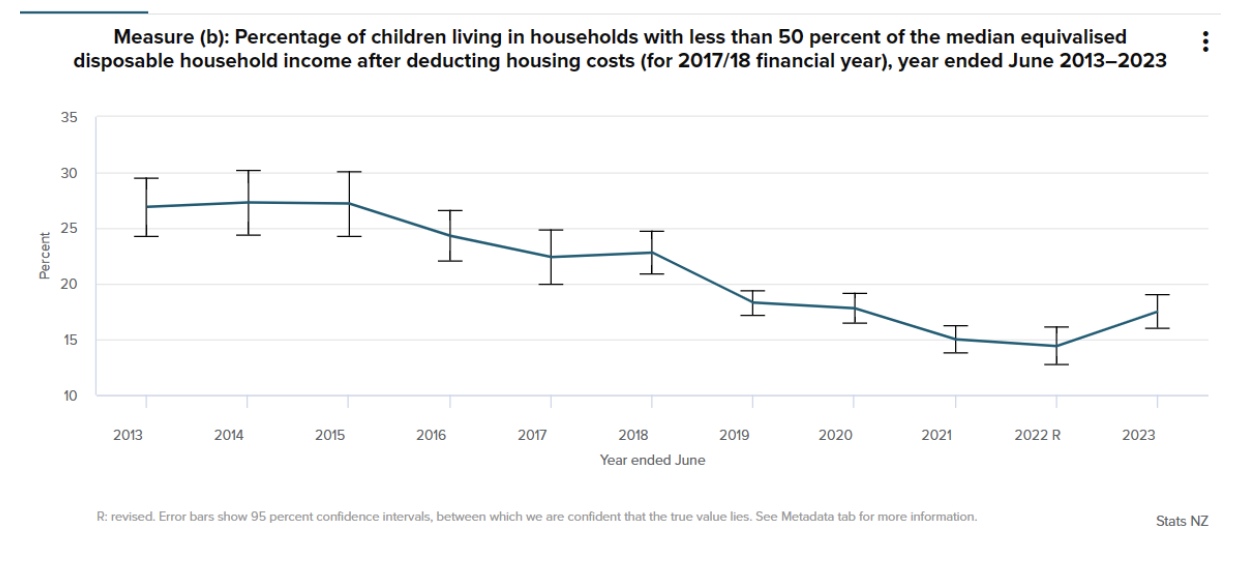Is Child Poverty really too hard to cure?
In the NZH editorial (Tuesday 27th Feb) , titled: ”New Zealand is failing our most vulnerable – our children” it was stated:
On Thursday, Stats NZ released its latest child poverty measures, showing in the year to June 2023, 202,100 children were deemed to be living in poverty in this country. That’s an increase of 3.1 per cent on the previous year.
Oops. The editorial is incorrect to say there is an increase of 3.1%. It should have said 3.1 percentage points. The actual increase in numbers of children is a whopping 35,900 or 20% and is described by Stats NZ as statistically significant.
This 50% AHC fixed line measure is expected to show a downward trend when real incomes (incomes after adjusting for inflation) rise as is normally the case and is the trend until recently as can be seen from the figure.

The measure used here is the canary in the mine as it indicates changes in absolute poverty. It counts children under the 50% 2018 after housing costs median household income maintained in real value by a simple CPI adjustment.
By year ended June 2023 it is clearly going in the wrong direction. More, not fewer children live in families who can’t sustain even the meagre 2018 standard of living of the 50% fixed line. Corroborating the conclusion that child poverty got worse, there is also a 2.5 percentage change in hardship, the third primary measure in the Act. This shows 143,700 children were going without basic needs, such as fresh fruit and vegetables and doctor visits, and had to put up with being sick and cold. These figures must be taken as, or more, seriously as in these fraught times.
Of course there are other reasons to be even more alarmed. The official figures are so far out of date by the time they arrive and fail to cover the worst-off children whose families do not have a secure household address. Much more attention should have been paid to the consistent reports from the NGO sector such as foodbanks, budgeting services, ACM, Salvation Army, KidsCan and Variety. Charities report food insecurity is the number one reason so many are seeking help. The situation for the 2023/24 year, not reported until 2025, will doubtless show further deterioration as there are no policy changes in the past year to suggest otherwise and the voices from the NGOS are louder than ever.
Victoria University of Wellington professor of public policy Jonathan Boston is quoted in the editorial saying:
…The data show how difficult it is to reduce poverty. We remain a country with significant child poverty and particularly high rates of poverty among Māori and Pasifika communities, which is very concerning.
Another interpretation would be that rather than it being ‘difficult’ there has just been no effective policies, especially in the last two years. We can expect now that merely increasing incomes will be even less likely to show an impact. One reason is that balance sheets of the poorest families have become seriously eroded as year after year the deficits have been filled with borrowing and a run down in assets. Debt servicing makes any deficits even worse.
Another reason is that to improve our stats in a cost effective way, means ways of pushing more support to the lowest income groups will have to be found.
Just because child poverty is now more intractable is no reason not to try serious policies to turn the trends around. Indeed it is absolutely imperative that these trends are rapidly reversed for all our futures. Fortunately, there are things that can be done and done quickly given the political will.
Here is a meaningful start.
- Immediately pay the full Working for Families tax credits to all low income families instead of leaving the poorest out, to fall further behind. The value of the IWTC in July will be almost $100 per week per family and 222,400 children would benefit. To join this onto the family tax credit so all get the same access would cost roughly $600m. The fact it is so expensive gives some indication of the amount that has been denied every year to the worst-off over the last 18 years.
- Immediately adjust the WFF threshold from the fixed 2028 figure of $42,700 to $53,700 and reduce the rate of abatement to 20% to take the pressure off families in full time low paid work. This would give them up to $3400 pa more and could cost another $680m.
- Annually adjust all aspects of benefits and Working for Families, including thresholds, for wages (or prices if prices rise more rapidly).
Of course other policies should be also used to reinforce income improvements. Bed in a decent lunch in schools programme with secure funding, improve child care subsidies and subsidise public transport for the young for example. Find ways to rebuild shattered balance sheets, especially in housing. Reduce the impact of debt including student loans with debt forgiveness programme.
So how can this be paid for? Here is one suggestion that would not increase poverty. Clawback 10% of NZ Super ($2 billion a year) from the wealthiest Superannuitants who would hardly notice with a modified surcharge as set out here: New Zealand Super as a basic income.







Susan St John this is long and what has come to mind in reply to the question – Is child poverty really too hard to cure? You may not want to put it up, as it may block others from putting forward their thoughts on the subject; or put it up later or just set it aside for now or permanently. I find it depressing and sad but from what I have experienced and read and seen I feel this is the future. Still I hope we could do better – but humans can compartmentalise their brains and do so well, forget at will, remember incorrectly, deviously behave. It could happen as strangely as the behaviour in The Handmaid’s Tale for instance.
This is my rotten thought that I usually push to the back of my mind but I am putting down once only as I have seen hopes for a better future dissipate over many decades. There is so little thought being put into our underlying values and how we should care and treat each other in NZ/AO and the world, that I am forced to consider the following. Conserving our good behaviour is under attack from popular culture and lack of commitment to each other, always under pressure from our wants and selfish desires for wealth exchange. Watch what happens when someone dies and the family gathers round for division of assets! Kindness and generosity is fleeting inspired by emotional pleas. Think Ayn Rand the Virtue of Selfishness which typically for society, swings too far from the other side of behaviour, which is abnegation of self for others. We may be running out of time to consider, adopt and reject pendulum swings and be stuck by circumstances and fast irreparable change in an extreme position from which there can be no timely recovery.
A co-ordinated society, looking after each other does require some unselfishness; it is necessary to some extent. The disclosures about Lake Alice and continuing callousness, and what goes on in our prisons and the difficulties of parents to access appropriate housing and other needs just fall on deaf ears at present, when we are comfortably off and in a position to change completely for the better.. We seem open to whatever new wave of human feeling comes along. No goodness is held strongly enough through our society to prevent behaviours that are destructive to things we say we hold sacrosanct.
It seems that we don’t believe in children any more, which echoes probably the seeming attitudes of the glutted avaricious who use politicians as puppets. They think along these lines; if we want children we can get them fashioned for us. The ordinary people can’t manage them or provide for them, and the world is overpopulated with insufficient resources. Technology can fill any gaps there are around. It seems to me, that having babies, children will become a licensed undertaking which must be applied and paid for.
To attempt to live out a traditional human life, one will have to join wealthy ‘charities’ or cults eg Gloriavale etc. There was a giant Moon organisation; the latest on the Moon cult – https://www.cbsnews.com/news/unification-church-japan-moonies-tax-exempt-religion-status-victim-compensation/ ($67 million victim compensation). Groups that seem modern like Scientologists or traditional like Amish in the USA will pursue moulded lifestyles and co-operate to some extent with the governing powers. They will have parameters within which members will have freedoms and be granted some rights to personal living styles. Some will later be threatened with change or closure and choose a Masada-like end. https://en.wikipedia.org/wiki/Masada
Faith Popcorn is a person and a brand who forecasts future business trends and also looks at people’s likely lifestyles. More and more these are influenced by business so what her business has been saying may show our possible future.* We used to have religions spiritual values, abandoned now to supposed factual rational science. Religion has been undermined by business and self-indulgence, and warped by deciding human behaviours are essentially non-religious. In trying to reach some high plane in religion, material values have crept in and displaced appreciation of our good natures and potentials. The ephemeral values of heaven and spirituality are abandoned as foolish and replaced by the ephemeral values of money which exists through an attitude of mind as heaven does; but requires thinking about which is out of fashion.
* https://www.fastcompany.com/90732637/3-things-youre-doing-wrong-when-you-try-to-plan-for-the-future
We want easy answers with pictures from our tech devices. What to do – disagree with unpleasant thinking – ban it and lock Assange and his like up till they die? Life should be easy as for the dwellers in Aldous Huxley’s Brave New World. https://en.wikipedia.org/wiki/Brave_New_World John Wyndham’s books tend to be about the quest for a human, loving lifestyle. Young Adult author John Christopher is very readable on what choices we might have to make in fashioning society. But reading is essential. We could set up groups who give away their television and talk about what they read. Maybe we could get new paths drawn from our own questioning brains. The story of Temple Grandin who I think is autistic illustrates an individual sensibility, different from others. We must work on developing similar in ourselves because following the mainstream is limiting our futures., yet we must fix on practicality and kindness to retain our humanity. https://en.wikipedia.org/wiki/Temple_Grandin
Yes , and surely the likes of Luxon with his 7 mortgage free houses can afford to go off his accomodation benefit, now $52,000 a year.He could do it voluntarily without even noticing .
“Given the political will”
Indeed.
Evidently, there is no real political will to sufficiently address this.
And that is the problem.
Universal basic income
Ubi will just create additional bureaucracy.
First, housing costs should be restricted to percentage of income.
Second, beneficiaries ought to be encouraged to work, by allowing them to keep more of their honest income, before benefits gets adjusted.
Classes such as cheaper cooking, parenting, self care, cleanliness and hygiene are some classes that ought to be run free of cost by local whanau.
So make us slaves to a UBI, rather than wage slaves. Me I wanna end slavery – and UBI don’t cut it.
UBI isn’t supposed to end poverty. It’s just something to do when the robots take over.
Child poverty Steven Joyce NZ Herald Saturday Feb 24th
Simple really wipe out poverty and NZ will go ahead in leaps and bounds .But then who will the government pick on then.
No one ever addresses the corrupt who will intercept this relief package in some way or another and keep it all to themselves leaving the people with nothing. This can be circumvented by harsher tax. Seizures. Or plain old arrest.
Well that would be back to the policies of the early 1980’s. We know what happened next: corporate lobbyists from the Mont Pèlerin Society and the Atlas Network managed to take over both political parties, and slash-and-burn “shock therapy” from the ‘Chicago Boys’ followed.
New Zealand has list its Zeal. We need people who can come up with new ideas and innovation and get that dynamism back. People need to be able to come up with goid ideas and get compensation for it from all walks of live.